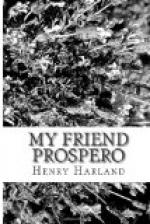“Oh? Not the castle?” questioned John. “Only the garden? And the olive wood? True, on reflection, I’ve never seen it in the house.”
“Nothing here is haunted,” said the parroco. He made a signal to Annunziata, who rose to change the plates. Her big eyes were alight, her serious little face was alert; but she would never dream of speaking in the presence of her uncle. Marcella, the cook, brought in the inevitable veal.
“Oh, for that,” insisted John, courteous but firm, “I beg your pardon. I myself have seen it on two occasions; and, lest you should fancy it a subjective illusion, I may tell you that it was yesterday seen simultaneously by another.”
“It? It? What is it?” asked the parroco, his beaked and ensanguined visage fiercer-looking than ever, as he fell upon the inevitable veal with a somewhat dull carving-knife.
“Ah,” said John, “now you make me regret that I haven’t a talent for word-painting. It’s the form of a woman, a young woman, tall, slender, in some pale diaphanous garment, that appears here, appears there, remaining distinctly visible for some minutes, and then disappears. No, it isn’t a subjective illusion. And it isn’t, either,” the unscrupulous creature added, after a pause, raising his voice, and speaking with emphasis, as if to repel the insinuation, while the darkness of disenchantment swept the face of Annunziata, “it isn’t, either, as some imaginative people might too hastily conclude, a wraith, a phantom, an insubstantial vapour. It’s a real material form, that lives and breathes, and even, if driven to it, speaks. There’s nothing supernatural about it,—unless, indeed, we take the transcendental view that Nature herself is supernatural. I was wondering, Don Ambrogio, whether, without violating a confidence, you could tell me whose form it is?”
“Nossignore,” said Don Ambrogio, economizing his breath.
“Ah,” sighed John, nodding resignedly, “I feared as much. Divining that I would institute inquiries, she has stolen a march upon me, and pledged you to secrecy.”
“Nossignore,” disavowed Don Ambrogio, raising eyes the sincerity of which there could be no suspecting.
John’s face took on an expression of aggrieved surprise.
“But then why won’t you tell me?”
“I cannot tell you because I do not know,” said Don Ambrogio.
“Oh, I see,” said John. “And yet,” he argued meditatively, “that’s hard to conceive. I don’t for a moment mean that I doubt it—but it’s hard to conceive, like the atomic theory, and some of the articles of religion. (I hear, by-the-by, that the scientists are throwing the atomic theory over. Oh, fickle scientists! Oh, shifting sands of science!) Surely there can’t be many such tall slender forms, in diaphanous garments, appearing and disappearing here and there in your parish? And one would suppose, antecedently, that you’d know them all.”
“A peasant, a villager,” said Don Ambrogio.




